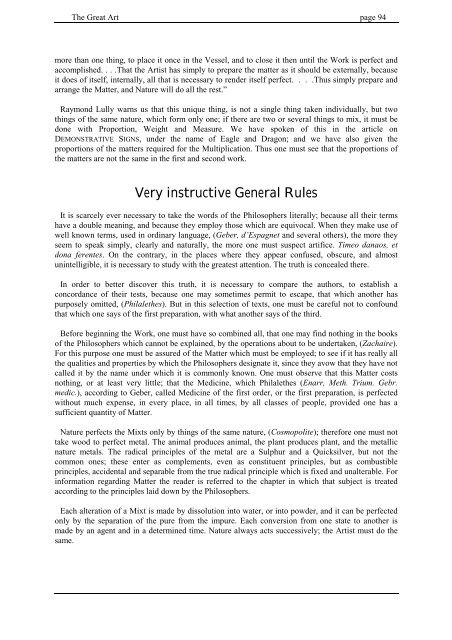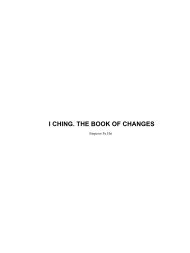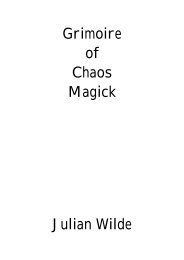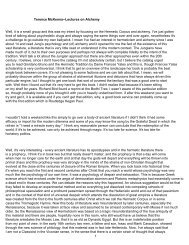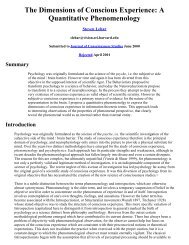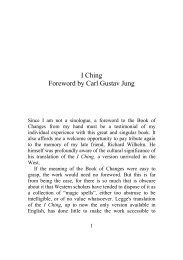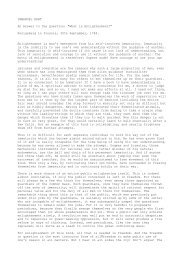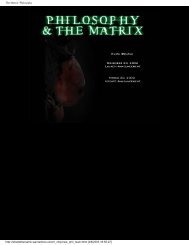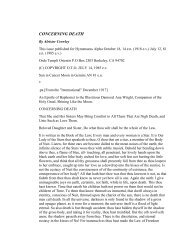Pernety - A Treatise On The Great Art.pdf - cyjack.com
Pernety - A Treatise On The Great Art.pdf - cyjack.com
Pernety - A Treatise On The Great Art.pdf - cyjack.com
You also want an ePaper? Increase the reach of your titles
YUMPU automatically turns print PDFs into web optimized ePapers that Google loves.
<strong>The</strong> <strong>Great</strong> <strong>Art</strong> page 94more than one thing, to place it once in the Vessel, and to close it then until the Work is perfect andac<strong>com</strong>plished. . . .That the <strong>Art</strong>ist has simply to prepare the matter as it should be externally, becauseit does of itself, internally, all that is necessary to render itself perfect. . . .Thus simply prepare andarrange the Matter, and Nature will do all the rest.”Raymond Lully warns us that this unique thing, is not a single thing taken individually, but twothings of the same nature, which form only one; if there are two or several things to mix, it must bedone with Proportion, Weight and Measure. We have spoken of this in the article onDEMONSTRATIVE SIGNS, under the name of Eagle and Dragon; and we have also given theproportions of the matters required for the Multiplication. Thus one must see that the proportions ofthe matters are not the same in the first and second work.Very instructive General RulesIt is scarcely ever necessary to take the words of the Philosophers literally; because all their termshave a double meaning, and because they employ those which are equivocal. When they make use ofwell known terms, used in ordinary language, (Geber, d’Espagnet and several others), the more theyseem to speak simply, clearly and naturally, the more one must suspect artifice. Timeo danaos, etdona ferentes. <strong>On</strong> the contrary, in the places where they appear confused, obscure, and almostunintelligible, it is necessary to study with the greatest attention. <strong>The</strong> truth is concealed there.In order to better discover this truth, it is necessary to <strong>com</strong>pare the authors, to establish aconcordance of their tests, because one may sometimes permit to escape, that which another haspurposely omitted, (Philalethes). But in this selection of texts, one must be careful not to confoundthat which one says of the first preparation, with what another says of the third.Before beginning the Work, one must have so <strong>com</strong>bined all, that one may find nothing in the booksof the Philosophers which cannot be explained, by the operations about to be undertaken, (Zachaire).For this purpose one must be assured of the Matter which must be employed; to see if it has really allthe qualities and properties by which the Philosophers designate it, since they avow that they have notcalled it by the name under which it is <strong>com</strong>monly known. <strong>On</strong>e must observe that this Matter costsnothing, or at least very little; that the Medicine, which Philalethes (Enarr, Meth. Trium. Gebr.medic.), according to Geber, called Medicine of the first order, or the first preparation, is perfectedwithout much expense, in every place, in all times, by all classes of people, provided one has asufficient quantity of Matter.Nature perfects the Mixts only by things of the same nature, (Cosmopolite); therefore one must nottake wood to perfect metal. <strong>The</strong> animal produces animal, the plant produces plant, and the metallicnature metals. <strong>The</strong> radical principles of the metal are a Sulphur and a Quicksilver, but not the<strong>com</strong>mon ones; these enter as <strong>com</strong>plements, even as constituent principles, but as <strong>com</strong>bustibleprinciples, accidental and separable from the true radical principle which is fixed and unalterable. Forinformation regarding Matter the reader is referred to the chapter in which that subject is treatedaccording to the principles laid down by the Philosophers.Each alteration of a Mixt is made by dissolution into water, or into powder, and it can be perfectedonly by the separation of the pure from the impure. Each conversion from one state to another ismade by an agent and in a determined time. Nature always acts successively; the <strong>Art</strong>ist must do thesame.


